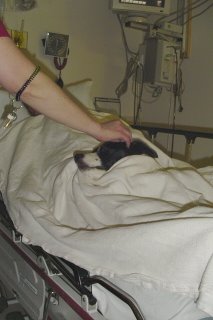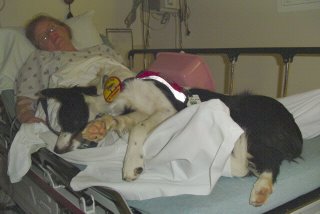 Did you purchase a trained dog or are you training your dog yourself?
Did you purchase a trained dog or are you training your dog yourself?When you and your service dog go out in public, you and your dog are representing every service dog team out there. Though as handlers, we are allowed to train our own service dogs, we should do our research and make sure we teach and train our dogs everything they need to know to act like the professionals that service dogs are.
HOW DO WE DO THIS?
 Basic obedience classes and puppy classes are a great place to start your service dog onto the right path. Look for a dog trainer that works well with both you and your dog. Don't be afraid to do more obedience work with your dog later on! This is great for the both of you.
Basic obedience classes and puppy classes are a great place to start your service dog onto the right path. Look for a dog trainer that works well with both you and your dog. Don't be afraid to do more obedience work with your dog later on! This is great for the both of you.
If you want to go the extra mile to make sure your service dog gets and keeps his/her professional edge, try some of these classes and tests:
1. Train your dog to pass the Canine Good Citizen (CGC) test (CGN or Canine Good Neighbour in Canada).
2. Have your dog study for and pass a public access test.
3. Keep doing advanced obedience classes.
4. Look into taking a "Pet Therapy" class with your service dog.
5. Look into entering your dog in some canine sports where the two of you can work as a team in a fun setting. (Flyball, Agility, Ultimate Frisbee...)
VOCALIZING...
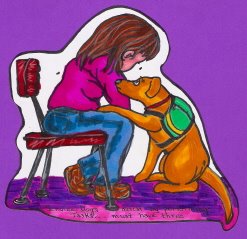 It is not a good idea to encourage your dog to bark, or allow the dog to bark or growl. Your dog may vocalize at the wrong time resulting on getting kicked out of a public place. Some handlers train their service dogs to vocalize as a way of alerting them of something (seizure, panic attack...) though there is some controversy among the service dog community as to whether this is acceptable or not. The general public may translate a barking or growling dog as being a dog that is displaying aggression. Other methods of alerting can be taught.
It is not a good idea to encourage your dog to bark, or allow the dog to bark or growl. Your dog may vocalize at the wrong time resulting on getting kicked out of a public place. Some handlers train their service dogs to vocalize as a way of alerting them of something (seizure, panic attack...) though there is some controversy among the service dog community as to whether this is acceptable or not. The general public may translate a barking or growling dog as being a dog that is displaying aggression. Other methods of alerting can be taught.
AGGRESSION:
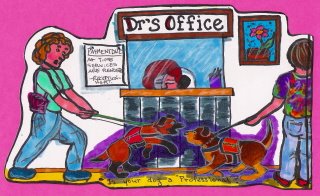 Do not EVER encourage aggressive behaviour in your service dog. (some barking may be aggressive). A guard dog's place is not out mixed in the general public. An attack dog cannot be a good service dog as it will be unpredictable, even when trained. Make sure you socialize your dog with other dogs and people as soon as you are able to do this (beginning before 4- months of age is best). Expose your dog to many settings and many situations as these things can help decrease the chance of dog aggression and some fear aggression. This will make for a more relaxed and pleasant dog for taking into the public.
Do not EVER encourage aggressive behaviour in your service dog. (some barking may be aggressive). A guard dog's place is not out mixed in the general public. An attack dog cannot be a good service dog as it will be unpredictable, even when trained. Make sure you socialize your dog with other dogs and people as soon as you are able to do this (beginning before 4- months of age is best). Expose your dog to many settings and many situations as these things can help decrease the chance of dog aggression and some fear aggression. This will make for a more relaxed and pleasant dog for taking into the public.
I am not an official licensed or certified dog trainer. I am simply a person who has a service dog and reads a lot and researches the things I need to know to train my service dog. The best thing you can do is to invest in working with a dog trainer on any behavioural and training problems that may arise during your work with your dog.
SERVICE DOGS IN PUBLIC: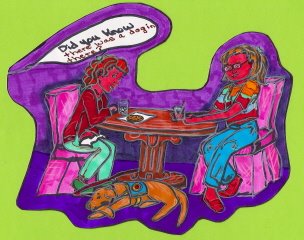 1- Your service dog must have three (3) identifiable tasks that s/he performs to help you to better function in skills of daily living.
1- Your service dog must have three (3) identifiable tasks that s/he performs to help you to better function in skills of daily living.
2- Your dog should neither be seen (if this is possible) nor heard when in a public restaurant
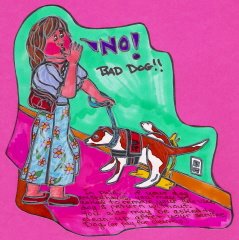 3- You may be asked to clean up after or pay for any clean-up or repairs for any damages or messes your service dog is responsible for.
3- You may be asked to clean up after or pay for any clean-up or repairs for any damages or messes your service dog is responsible for.
Did you know that if your service dog stains or damages something that you may be asked to pay for the cleaning or repairs (if it is policy for clients and customers in general to pay for such things if they ocur). Also, be respectful and clean- up any feces your dog leaves behind. An easy to carry piece of equipment to assist you with this unpleasant responsibility of dog ownership is a small plastic "poo bag" dispenser filled with a roll of bags. The dispensers can hook to a belt loop, leash handle, pocket book strap, or backpack and is fairly descreet.
A SERVICE DOG IS NOT JUST A PET!
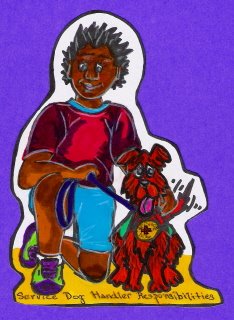 (Actually, your service dog is considered as being "adaptive equipment".)
(Actually, your service dog is considered as being "adaptive equipment".)
Is your service dog getting the medical care and up- keep s/he needs to be healthy and working in the public?
1. Take your dog to the vet on a regular basis
2. It is highly recommended that you get your SD spayed or neutered.
3. Keep your SD up to date on vaccines
4. Give your dog a general de-worming treatment monthly (or as prescribed from a vetrinarian)
5. Give your SD preventative flee/tick medicine
6. Keep thorough medical records
7. Carry proof of vaccines with you at all times.
All of the above medical treatments and preventatives cost some money, but it can save your dog's life. It is healthy for you, your SD and the public when your dog is well cared for in this way. Some public places may want to see proof of vaccinations before you can enter the building (hospitals, places with other animals...)
1- Your dog must not smell bad. Also perfumes and colognes are not allowed in some public places anymore due to allergic reactions of some individuals.
2- Your SD must be groomed (brushed) and be kept mat- free.
3- Keep your SD's nails trimmed.
4- Bathe your SD regularly. (I normally give Rowena a bath every week)
Also remember...
5- If your SD is sick or is in pain, DO NOT make the dog work. This is cruel and neglectful.
6- Keep your dog leashed in public places while working (and abide by public leash laws at other times) and make sure that your dog can follow and obey basic verbal/gesture commands and remain under control.
7- Pick up your dog's poo!
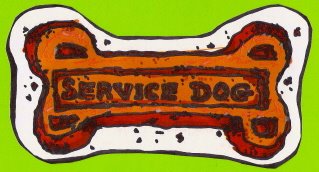
Not all dogs are cut out for service work. If a dog intended for service work does not work out or if you find that training and caring for your SD is more than you can handle and you have run out of options, make a responsible choice. Retire the service dog to live as a house pet either with you or in a new home. If you purchased your SD from a training program, you may have signed a contract with them in regards to such issues. Also, some dog breeders have you sign a contract with them asking that you return the dog to them before finding the dog a new home. Not all dogs are cut out for service work, and training and caring for a service dog is a great responsibility that not everyone will feel ready for. Where are a lot of internet support groups for people who use service dogs and they can be helpful.
Remember: When you and your service dog are out in public, you both are representing every service dog team. The future outcomes in legistlature, public attitudes and acceptance of service animals and the right we have to train (and not certify) our own service dog can be greatly affected... either positively or negatively, by how you and your service dog present yourselves and behave. Do not make us look bad or we can all lose out. Only work for and expect the very best from your SD.
PLEASE...
BE A RESPONSIBLE SERVICE DOG HANDLER!
 Yes, service dogs ARE welcome here, but... Did you know that if your dog misbehaves: Barks in public, growls aggressively or otherwisw disrupts things in a public place that you may be asked to remove your service dog from that setting and come back without him or her? It's true... and it is NOT considered a violation of your rights. That is why it is so important for you to make sure that you and your service dog keep up with your public access training and obedience.
Yes, service dogs ARE welcome here, but... Did you know that if your dog misbehaves: Barks in public, growls aggressively or otherwisw disrupts things in a public place that you may be asked to remove your service dog from that setting and come back without him or her? It's true... and it is NOT considered a violation of your rights. That is why it is so important for you to make sure that you and your service dog keep up with your public access training and obedience.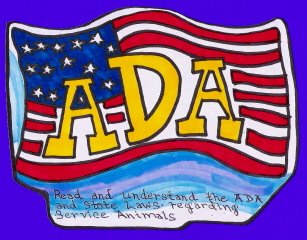 Yes, it is true that when you are asked if your dog is a service dog that the person only needs your word ("Yes, my dog is a medically necessary service animal") and that you do not have to show certification, ID or varify by any other means.
Yes, it is true that when you are asked if your dog is a service dog that the person only needs your word ("Yes, my dog is a medically necessary service animal") and that you do not have to show certification, ID or varify by any other means.


















